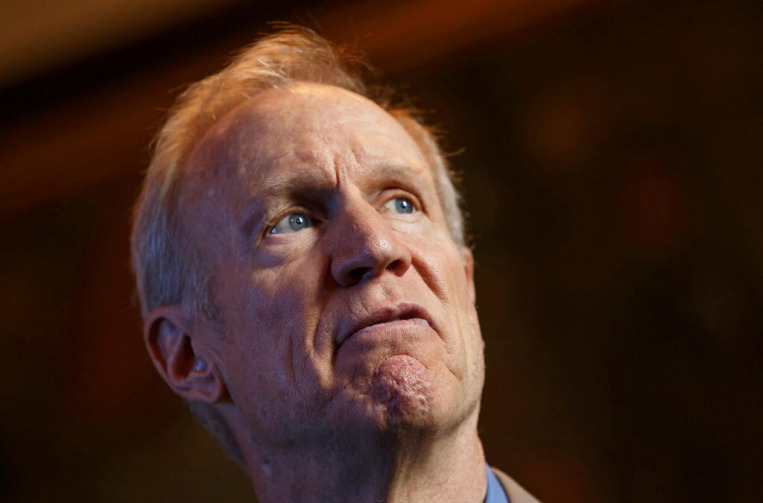Illinois Gov. Bruce Rauner is looking to Washington to curtail worker rights, wipe out pension obligations, destroy prevailing wage and implement Right to Work. Illinois must say NO to Rauner and make him “One-Term Bruce”!
Rauner looks to Washington for the power to change pension benefits
Peoria Journal Star
By Kim Geiger of the Chicago Tribune
Oct 22, 2017
Stymied by a Democrat-controlled General Assembly and still in a contract dispute with the largest state employee union, Republican Gov. Bruce Rauner is looking to Washington for help advancing his agenda to weaken the influence of organized labor in Illinois.
He’s lobbying Congress to give states like Illinois the power to change public employee pension benefits, which he argues are overly generous because of a “corrupt bargain” between politicians and union negotiators. And the governor is hoping to get legal victories over unions at the U.S. Supreme Court, where the recent appointment of a new conservative justice could tilt decisions in his favor.
As a candidate and as governor, Rauner had proposed cutting pension costs by transitioning workers to less generous benefit packages or 401(k)-style retirement plans. But past attempts to cut retirement costs have run up against legal problems. The Illinois Constitution stipulates that benefits cannot be “diminished or impaired” once they are bestowed to workers, and the state Supreme Court has stood by those words.
The governor thinks Congress can release the state from that restriction by passing a law that would give states permission to come up with cost-saving changes to their pension programs. The option would be available to states only after they had established that spending money on workers’ retirement plans is hampering other essential services.
“There’s so many things that we can’t touch because we’re unreasonably hamstrung,” Rauner said. “And the federal government can say, ‘No, federal restructuring law supersedes the state restrictions, Congress is freeing up states to restructure their pensions as they need to, as they see fit.’”
The idea comes from conservative policy circles but hasn’t been written into legislation that’s been seriously considered in Washington. Critics like Democratic Illinois Senate President John Cullerton said the idea raises “serious constitutional concerns.”
“Frankly, I find it troubling that a governor would turn to Congress and Donald Trump to try to invalidate his own state’s constitution,” Cullerton said. “If it starts with workers’ retirement security, where would it stop?”
Even as he blames the state’s pension woes on unions, the governor is looking to the U.S. Supreme Court for help diminishing their power. Rauner got a boost from the court last month when the justices agreed to hear a case he initiated when he first took office in 2015.
That case centers on government employee unions, which collect what’s known as “fair share” fees from nonmembers. The thinking behind the fees is that all employees should pay for the cost of negotiating contracts and handling employee grievances and other services provided by unions. Rauner wants to put a stop to the fees, contending that requiring nonmembers to contribute financially to a union is a violation of their rights to free speech.
 A decision in that case is expected next year. A similar case was heard by the Supreme Court in 2016 and resulted in a 4-4 tie vote after Justice Antonin Scalia’s death left the bench with just eight members. Justice Neil Gorsuch, Trump’s new appointee to the court, could hold the tie-breaking vote.
A decision in that case is expected next year. A similar case was heard by the Supreme Court in 2016 and resulted in a 4-4 tie vote after Justice Antonin Scalia’s death left the bench with just eight members. Justice Neil Gorsuch, Trump’s new appointee to the court, could hold the tie-breaking vote.
A second, lesser-known case is also making its way through the legal system, and Rauner hopes it, too, will land at the high court.
That case involves an attempt by the Lake County village of Lincolnshire to enact what’s known as a right-to-work ordinance — a measure that would prohibit private sector employers from entering into agreements with unions that require workers to join or pay fees as a condition of employment. Some Midwestern states have enacted such laws in recent years, and Rauner says the shifting landscape has left Illinois at a competitive disadvantage to its neighbors. He’s contended that individual communities should have the freedom to decide if they want to require union membership.





